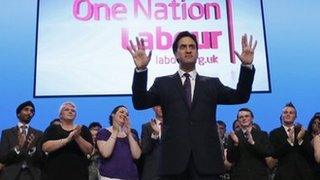Labour: Could energy pledge power Miliband to victory?
- Published

Ed Miliband said Labour's conference would be about helping people with the cost of living. And he clearly meant it.
A promise to freeze gas and electricity prices until 2017 is nothing if not clear.
It has the advantage of being simple enough to sell easily on the doorstep and the potential to cut through to the wider public. Labour activists finally have something to say. About time too, they may also say.
There are risks, of course, and questions to ask. What is to stop energy companies raising their prices before 2015 or after 2017? Will this discourage energy firms from investing in renewables?
Won't this create 18 months of uncertainty for the energy industry until the election, risking investment and jobs? And frankly, isn't it all rather old Labour, the idea of governments intervening directly in markets to fix prices, echoes of the price controls of the 1970s that did so little to encourage economic growth?
When a Labour leader says, "It is time to reset the market," businessmen tend to shiver. Already Mr Miliband's opponents are describing this policy as left wing and anti-business and dusting off their Red Ed headlines.
Labour officials have answers for many of these questions - above all that it is businesses which will benefit most from an energy price freeze - but that is almost beside the point.
Empathy
Labour can now tell voters that they would help with energy bills and that will do them fine. No more high-minded theories from that intellectual chap, Mr Miliband, just retail politics they hope everyone can understand.
But is it enough? Is it enough to help Labour into office? Ed Miliband's argument was based on the premise that the link between economic growth and living standards is broken.
As he said, the rising tide doesn't lift all boats, just the yachts. That allows him to talk less about the economy and more about how to help people feeling the pinch.
First, he claimed that only he and Labour could empathise with and understand voters who are struggling to make ends meet. The implicit claim, of course, was that the Conservatives could not do this.
Second, Mr Miliband delivered a list of promises to help - with more, free child care, a higher minimum wage, more house building, tax cuts for small businesses and now frozen energy bills.
In short, his message was this: yes, there may be an economic recovery but not everyone is feeling its benefit. Labour will help people who are struggling.
And Labour will be more optimistic about the future than other parties. The slogan that wrapped this altogether was the phrase: Britain can do better than this.
Optimism
The aim was to position Labour as the party that stands for optimism, something that David Cameron once claimed for the sunshine-seeking Conservatives.
Mr Miliband also used the speech to try to deal with his poor standing in the opinion polls. To critics who say he lacks the leadership qualities to be prime minister, he cited his willingness to defy his brother and Rupert Murdoch and resist war with Syria.
In this list he chose not to refer to his tussle with the trade unions over party reforms where some think he is not showing enough leadership.
To those critics who think he's a geek, he showed he was comfortable with the tag by making self-deprecating jokes, pledging - if that is the word - not to take his shirt off in public if he were prime minister.
He told repeated stories about people he had met up and down the country, trying to show that he could engage with ordinary people. We saw today a little more of the natural Ed Miliband one sees in private compared to the somewhat stiff and awkward figure he can cut in public.
Perhaps most importantly, he took these criticisms head on and said he would relish a debate with David Cameron about leadership and character, accusing the prime minister of giving in to Rupert Murdoch, the tobacco lobby and millionaire businessmen.
Unanswered questions
So will all this work? By focusing so much on the cost of living, it might appear to some as if Mr Miliband is dodging the economy. There are still some unanswered questions.
What would he and Labour do to secure the recovery? How can he reassure voters that the recovery would be safe in Labour's hands? Because to do that, the party will have to tell voters its plans for the deficit, what it would cut and when and at what pace.
And there was little talk of that today. Labour has spent much of this week saying what it would spend.
It has yet to say in any detail what it would cut. One thing lacking from the speech was anything substantive on welfare.
There are also challenges with the message. After being so cautious for years about policy, Labour is now bombarding the public with promises. The risk is that this creates a blur in people's minds, crowding out essential messages.
The energy price freeze has the potential to cut through but Labour will have to follow through and repeat endlessly the policies it has announced this week. Their track record of this is not brilliant. Mr Miliband gave a good speech last year too but its political impact was squandered.
As for the Labour leader himself, he has used this speech to try to counter some of the negative impressions about his leadership. Acknowledging there is an issue is a start. But public impressions, once they are entrenched, can be hard to shift.
Today his speech was deliberately littered with references to what he would do as prime minister. The aim was to make that concept sound reasonable. Whether voters think it so, we shall find out in 20 months' time.